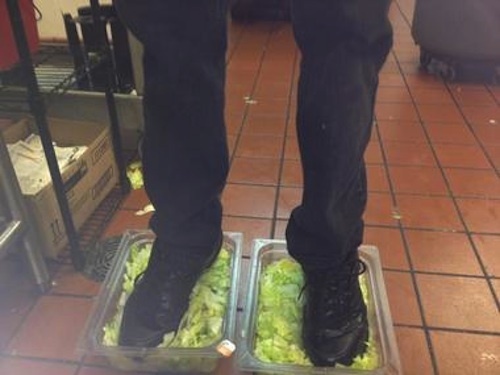Michael Booth of the Denver Post published an excellent investigative piece Friday about a 2009 E. coli outbreak that appeared linked to lettuce at restaurants in six states, but was never made public. Excerpts below:
The FDA’s decision to let the six-state E. coli probe go dormant, despite clear leads, is part of what some food safety experts call a worrisome "cone of silence" around leafy green produce problems in the United States. These experts say the FDA dropping promising outbreak clues blocks efforts to force better growing and packing methods.
And they say the federal government’s tendency to avoid naming names — even when state officials know the producers and suppliers — robs consumers of vital information. In an October 2011  salmonella outbreak that sickened 68, federal agencies told journalists there was no public benefit in being more specific than problems at Mexican "Restaurant Chain A."
salmonella outbreak that sickened 68, federal agencies told journalists there was no public benefit in being more specific than problems at Mexican "Restaurant Chain A."
It was the Oklahoma health department that disclosed the chain where many victims had eaten was Taco Bell.
"As someone who is out in fields with farmers, it’s really hard to get them excited about food safety if they never hear about other outbreaks," said Doug Powell, a Kansas State University food scientist who advocates for wider probes and public disclosure. "We have evidence that telling stories makes a difference."
"I will forever be mad that the FDA didn’t pursue" the 2009 E. coli cases that included Colorado, said Kirk Smith, a veterinarian and supervisor of the foodborne disease investigation section of the Minnesota Department of Health.
"It was a smaller outbreak, but still, if you figure out what the food is, even after the fact, you can hopefully get back to where that food was produced and perhaps correct something so there’s not a bigger outbreak in the future."
State health officials grow nervous every September with the crowds, heat and open-air food at the Colorado State Fair in Pueblo. When two cases of E. coli O157:H7 matched at the state lab, one from a Jefferson County child and another from a Pueblo County child, health investigators moved fast.
County reporting forms showed both sick kids had attended the state fair. State officials urged the counties to speed up questioning, trying to nail down where the kids ate and what foods they had in common.
As they waited for more answers, cases in Minnesota, Iowa and three other states loaded illness cases into a national network and matched the genetic fingerprint.
Cases in Minnesota and Iowa had eaten at the same Italian-style restaurant in Omaha, Nebraska, in early September. So had a North Carolina case. When Colorado got its deeper case histories back, it found both state victims had eaten at an Italian-style restaurant in Pueblo.
More questions zeroed in on house salads. Even when the victims hadn’t ordered salad, they had nibbled from a family member’s plate. Eight of 10 cases had eaten lettuce at a restaurant, according to a Colorado outbreak memo obtained through the open records act.
States sought the restaurants’ suppliers. Colorado learned that the lettuce used in Pueblo came from a major produce supplier in the Salinas Valley of California, Tanimura & Antle.
The patients, meanwhile, made slow recoveries. Some were in the hospital for days. E. coli is particularly worrisome to food experts because it can cause severe gastroenteritis, pneumonia and kidney failure.
And then the FDA and CDC dropped the case.
Once state public health officials identify an out-of-state supplier, they rely on the federal government’s powers to move across boundaries and push outbreak probes forward. But what Colorado and Minnesota officials heard was silence.
By mid-October, officials in those states asked the CDC and FDA for a status on the case. On Oct. 28, .jpg) according to e-mail records released by Colorado, CDC epidemiologist Colin Schwensohn told the states "with no recent cases, this cluster is less of a priority."
according to e-mail records released by Colorado, CDC epidemiologist Colin Schwensohn told the states "with no recent cases, this cluster is less of a priority."
Minnesota’s Smith fired back the same afternoon, saying "I think it is a huge mistake for FDA to drop this." Smith’s e-mail to the CDC and other investigators, which he acknowledged was a "rant," went on:
"If FDA won’t fully engage and work backwards from 2 restaurants on a rock solid lead, then all of their claims about making things better are all so much talk."
Colorado officials took a more measured approach, but still protested. "Colorado and other states challenged this decision, but FDA did not change its position about pursuing the traceback further," according to a state memo.
Colorado epidemiologist Alicia Cronquist said in an interview, "We were extremely frustrated." The states got on a conference call and said a deeper probe would prevent future outbreaks, Cronquist said.
The FDA declined comment, beyond the limited information about the federal agencies’ reasoning contained in e-mails at the time, which were released by Colorado in the open records request. Neither the FDA nor the CDC offered responses to specific questions about the 2009 outbreak, or to general questions about how investigations end.
"Consumers of food have a right to know, period. And as taxpayers, consumers have a right to know what public health officials know about those same food producers," said Seattle attorney Bill Marler, a litigator for outbreak victims. Marler’s firm was briefly a co-counsel for one of the Colorado victims suing over the 2009 E coli illnesses.
Early e-mails in the 2009 outbreak identified the restaurants that consumers said they had in common. Colorado named the produce grower, Tanimura & Antle, in its wrap-up memo, but said the restaurants did not appear to be at fault. Tanimura & Antle did not return calls seeking comment.
KSU’s Powell argues for more disclosure. At the least, he said, CDC policy should make it clear why they name some restaurants and producers, and not others. The CDC stuck with "Restaurant Chain A" for the October 2011 salmonella outbreak even though Oklahoma had disclosed half the victims had eaten at Taco Bell.
"If Taco Bell keeps making people sick with lettuce, I want to know it’s Taco Bell," he said. "How bright are they in choosing their lettuce suppliers?"
Taco Bell did not return phone calls seeking comment.
Cronquist said Colorado tries to strike a balance. If the public is still at risk from food, companies are identified. But the state also needs compliance from various facilities while it investigates. Moreover, victim interviews can be skewed by early disclosure; if they have heard "Taco Bell" or "green onions," it can bias their answers.
 was posted to Reddit with the caption, "Don’t f–k with people’s food."
was posted to Reddit with the caption, "Don’t f–k with people’s food."
.jpeg) Or the sick people.
Or the sick people..jpg) therefore becomes their badge of honor.”
therefore becomes their badge of honor.” cases of E. coli O157:H7 in the city, according to Micaella’s mother, Victoria Boer.
cases of E. coli O157:H7 in the city, according to Micaella’s mother, Victoria Boer..jpg) bacteria to consumers is greatly reduced."
bacteria to consumers is greatly reduced.".jpg) so again at the program’s end.
so again at the program’s end..jpeg) “I wash it every time but I don’t know if it actually helps.”
“I wash it every time but I don’t know if it actually helps.” salmonella outbreak that sickened 68, federal agencies told journalists there was no public benefit in being more specific than problems at Mexican "Restaurant Chain A."
salmonella outbreak that sickened 68, federal agencies told journalists there was no public benefit in being more specific than problems at Mexican "Restaurant Chain A.".jpg) according to e-mail records released by Colorado, CDC epidemiologist Colin Schwensohn told the states "with no recent cases, this cluster is less of a priority."
according to e-mail records released by Colorado, CDC epidemiologist Colin Schwensohn told the states "with no recent cases, this cluster is less of a priority.".jpg) safety step, but many peers agreed with the company’s “abundance of caution.”
safety step, but many peers agreed with the company’s “abundance of caution.”.jpg) Nevada began removing iceberg lettuce from shelves.
Nevada began removing iceberg lettuce from shelves.